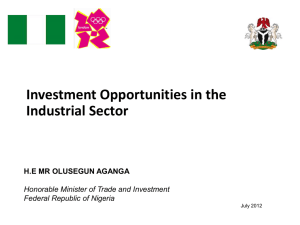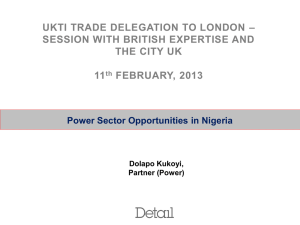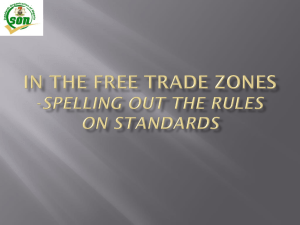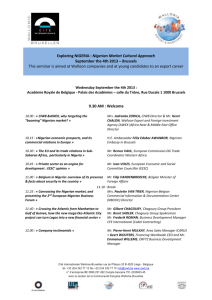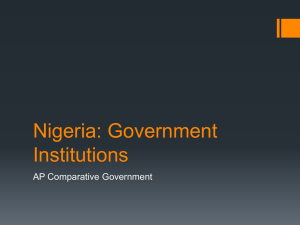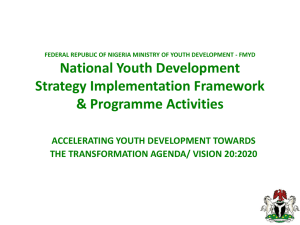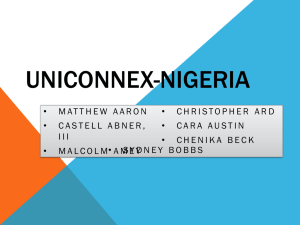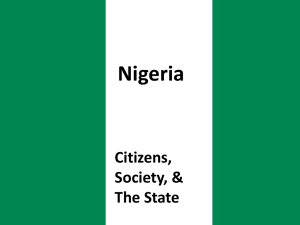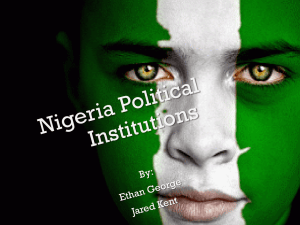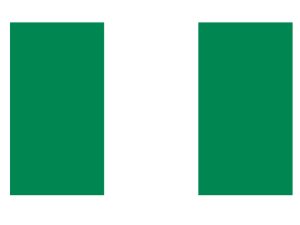administration__enforcement_of_copyrights_in_nigeria_notap
advertisement
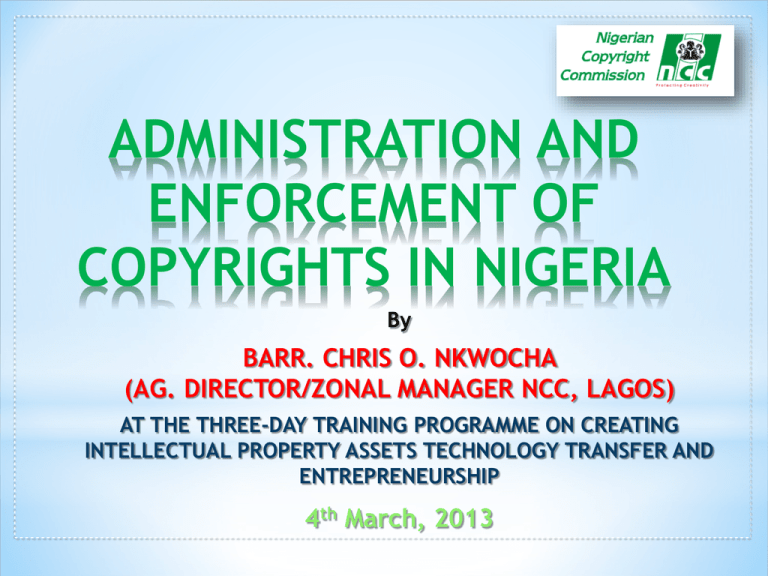
ADMINISTRATION AND ENFORCEMENT OF COPYRIGHTS IN NIGERIA By BARR. CHRIS O. NKWOCHA (AG. DIRECTOR/ZONAL MANAGER NCC, LAGOS) AT THE THREE-DAY TRAINING PROGRAMME ON CREATING INTELLECTUAL PROPERTY ASSETS TECHNOLOGY TRANSFER AND ENTREPRENEURSHIP 4th March, 2013 INTRODUCTION Intellectual Property according to WIPO refers to creations of the mind, such as inventions; literary and artistic works; designs; and symbols, names and images used in commerce. These Intellectual Property Assets are protected by Law through Copyright, Patents, and Trademarks. In other words, in generating a sustainable economic environment, there must be a balance in the interests of both the right owner and the end users. Photo credit:: Loves.co.uk WHAT IS COPYRIGHT? The rights granted to an author over his works or creations and protected by the law is called Copyright. This same law forbids the exploitation of such works for economic purposes without the express authorisation of the right owner. The unauthorized commercial exploitation of such copyright works thriving in an environment devoid of control and inadequate regulation and enforcement is known as Piracy. It is a criminal offence actionable in civil law, it is also known as Intellectual Property Crime & Counterfeiting. THE ESTABLISHMENT OF THE NIGERIAN COPYRIGHT COMMISSION The Commission was established in August, 1989 following the enactment of the Copyright Act in December, 1988. This Act empowers the Commission to administer all issues bothering on copyright in Nigeria. It also mandates the Commission to regulate and enforce the Copyright Act. In 1992, the act was amended by a decree introducing four additional sections to expedite the management of copyright. And again in the year 1999 to safeguard creative works effectively. ORGANIZATIONAL DEPARTMENTS IN THE COMMISSION Administrative Department Planning Research & Statistics Department Regulatory Department Prosecution Department Accounts Department Enforcement Department POWER OF COPYRIGHT INSPECTORS The Copyright Act empowers the Copyright inspectors giving them authority to posses all the powers, rights and privileges of Police Officers as defined under the Nigerian Police Act and any other relevant enactment pertaining to the investigation, prosecution of defence of a civil or criminal matter under the Copyright Act. By S38 of the Act, the copyright inspector may • Enter, inspect and examine premises which he reasonably believes to have committed an offence • Make examinations POWER OF COPYRIGHT INSPECTORS (contd.) • Demand information from any person found in such building • Carry out examination analysis • Exercise other powers as commission may delegate • Prosecute and defend cases arising from the Act • Have all powers rights and privileges of a police officer as defined in the police Act and other enactment in the investigation, prosecution and defence of cases under the Act Copyright Inspectors at work COPYRIGHT LAW IN NIGERIA Copyright is a major branch of intellectual property law which gives exclusive rights to the creator of a work, particularly, products of intellectual exertions in the area of arts. The Nigerian Copyright system identifies restrictions and concessions to copyright, which are considered an essential part of a well functioning copyright system. This limitation includes the ‘fair-use’ provision, which allows certain uses without permission of the copyright holder. Director General, NCC, Mr. Afam Ezekude, at the site of a post-raid operation on pirated Literary works, displaying a pirated copy of the Oxford Advanced Learners Dictionary. ENFORCEMENT ACTIVITIES (REGULATORY SCHEMES) The Commission instituted some administrative/regulatory systems, in order to ensure that owners and users of copyright works comply with the requirement of the copyright law, the Commission has instituted the following • • • • • • Copyright Notification Scheme Copyright Video Rental Regulations (Now suspended) Copyright Optical Disc (Plants) Regulations Copyright (Security Devices) Regulations Copyright Collective Management Organizations Levy on Copyright Material ENFORCEMENT ACTIVITIES REGULATORY SCHEMES (contd.) - The essence of these regulatory schemes is to properly regulate the copyright-based industries and enable the right owners to maximally benefit from their creative endeavour/investment, while also allowing the public lawful access to these creative works. The Notification Scheme and Optical Disc Regulations Scheme have variously helped the Commission’s operatives determine the true owner of a work in the course of their investigation. Members of the press interviewing a stakeholder during a press briefing at the Lagos office of the Commission COLLABORATION The Commission works closely with some organizations including Intellectual Property stakeholders (the right owners) & government agencies to enhance interagency and co-ordination in curbing piracy in Nigeria. • STAKEHOLDERS • Nigerian Publishers Association ﴾NPA﴿, Music Label Owners, Recording Industries Association of Nigeria ﴾MORAN﴿, Nigerian Printers, etc. • FEDERAL LAW ENFORCEMENT AGENCIES • Nigerian Customs Service • Nigeria Police • Standard Organization of Nigeria • NOTAP • EFCC e.t.c COLLABORATION (contd.) • JUDICIARY Government Agencies - We have effective collaboration with all other enforcement agencies in Nigeria, such as the Nigerian Customs Service, that assists the Commission on activities at the Ports and invites us over for thorough inspections on containers carrying suspected pirated works. Police – We do not carry and posses fire arms and so we implore the use of the Nigeria Police force during operations in other to strengthen efforts in combating intellectual property crime. DG, NCC, Afam Ezekude , Director Enforcement, Augustine Amodu inspecting seized items at the Ports. Director/Zonal Manager, Lagos office of the Commission Barr. Chris Nkwocha and some officers of the Nigeria Customs Service addresses the press during a handing over ceremony of seized containers. CONCLUSION Our goal is to engage stakeholders with the view of identifying the most suitable means of advancing the interests of Nigeria’s copyright industries & to create sustainable copyright frameworks that enhance Nigeria’s economic development. We look forward to a continued positive partnership with agencies like NOTAP in protecting and encouraging creativity. THANK YOU.


